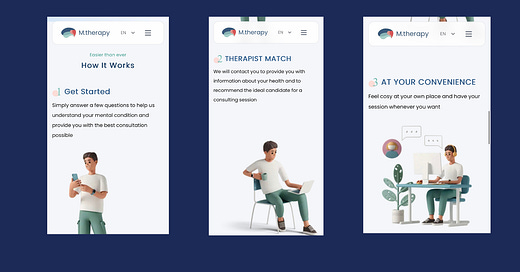How Two Iraqi Entrepreneurs Are Breaking Mental Health Stigmas
Founders Hussein Mahmood and Midya Ismail combine their diverse expertise to offer accessible, private counseling solutions, reshaping cultural attitudes toward therapy.
When Hussein Mahmood met Midya Ismail on an accelerator course for entrepreneurs, he wasn’t looking for a business partner. An employee at the Ninevah health department by day, he used evenings to pursue his passion for designing digital products. Then, he secured a place on the FiveOneLabs accelerator program, Ignite, and found an opportunity to turn his hobby into a business with the potential to make a powerful impact.
“I’ve always wanted to help those in need,” says Mahmood, who planned to enhance his skills in digital design and start a business that would improve people’s lives. But he didn’t expect to work in mental health until he encountered Ismail, who told him about her idea to tackle the stigma surrounding therapy in Iraq and create a space that would normalize it.
A graduate of the University of Duhok, Ismail had studied pharmacy but planned to become an entrepreneur. She joined the program in 2022 to launch a mental health platform, hoping to harness her medical knowledge to build a business that would help people deal with difficult experiences and support their recovery.
The idea came during a period of struggle in her own life when she needed support. It was late at night when the notion of a mental health platform suddenly seemed obvious—a way to make therapy available on a wider scale without compromising people’s privacy.
Joining Ignite, she met Mahmood and was struck by his commitment and professionalism. “We realized we shared the same aim and vision but were on different paths, so we decided to collaborate to achieve our goals,” Mahmood says.
Together, they created M. Therapy, a platform that provides counseling programs online and educates people about the importance of mental health. Traditionally, there has been a lot of stigma associated with visiting a psychiatrist in Iraq, but gradually, attitudes are starting to change.
“Today, we see people come out and talk about their mental health difficulties in public, which encourages people to take action and care for their mental health, and it pushes us to continue fighting for this cause,” says Mahmood, who received an Innovation Hub grant from Ideas Beyond Borders to help launch the platform.
M.Therapy was among the first projects to receive an Innovation Hub grant through IBB’s new Kurdistan is Open for Business program, which aims to create a pro-business climate and transform the landscape for startups in Kurdistan. Working with local NGOs and Kurdish authorities, the project will ease the business registration process, provide grants and technical assistance to dozens of entrepreneurs, and launch a one-million-view social media campaign to bolster Kurdistan’s credentials as a destination for new business.
“M.Therapy is an example of what successful collaborations can achieve when we invest in the emerging ecosystem for entrepreneurs,” says Faisal Al Mutar. “Supporting innovation can only lead to more growth as these entrepreneurs inspire others to pursue bold ideas with the potential to make a lasting impact.”
Feedback from M.Therapy users indicates that people are embracing the opportunity to engage with therapists via an online platform. “We have people saying they feel comfortable and feel they can express their feelings in a safe environment,” Ismail says.
She and Mahmood hope that M.Therapy can play a role in improving the culture around mental health well-being in Iraq and drive improvements in the support people receive. “Iraqis are still suffering from the accumulation of war and violence over the last 30 years. The stigma of having mental health issues and the poor state of the mental health sector in Iraq are why we decided it was worthwhile to help people in this field,” Mahmood says.
This article was written by Olivia Cuthbert.





